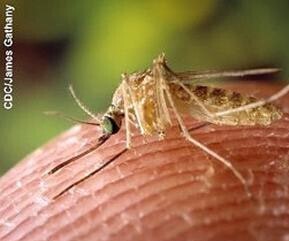
Dead Bird Test Positive for WNV in Kane County
Kane County Health Department Advises Residents to Take Precautions to Prevent West Nile Virus Disease
A dead bird found in St Charles has tested positive for West Nile Virus (WNV). Collection of dead birds is important because they help to assess West Nile Virus activity in an area.
Presence of dead birds positive for WNV predicts where humans may be at higher risk for West Nile Virus infection. As part of its West Nile program, the Health Department sends a limited number of certain dead birds to the state lab for testing. Please call (630) 444-3040 to report the presence of freshly-dead birds (such as crows or blue jays) to determine if WNV testing is recommended. The birds must not show any signs of decay, trauma, maggot or insect activity.
West Nile virus is transmitted through the bite of a mosquito that has picked up the virus by feeding on an infected bird. Most people with the virus have no clinical symptoms of illness, but some may become ill three to 14 days after the bite of an infected mosquito. Only about 2 persons out of 10 who are bitten by an infected mosquito will experience any illness. Illness from West Nile Virus is usually mild and includes fever, headache and body aches, but serious illness, such as encephalitis and meningitis, and death are possible. Persons older than 50 years of age have the highest risk of severe disease.
The best way to prevent West Nile Virus disease or any other mosquito-borne illness is to reduce the number of mosquitoes around your home and to take precautions to avoid mosquito bites. Precautions include:
• Avoid being outdoors when mosquitoes are most active, especially between dusk and dawn. Use prevention methods whenever mosquitoes are present.
• When outdoors, wear shoes and socks, long pants and a long-sleeved shirt, and apply insect repellent that includes DEET, picaridin or oil of lemon eucalyptus according to label instructions. Consult a physician before using repellents on infants.
• Make sure doors and windows have tight-fitting screens. Repair or replace screens that have tears or other openings. Try to keep doors and windows shut, especially at night.
• Change water in birdbaths weekly. Properly maintain wading pools and stock ornamental ponds with fish. Cover rain barrels with 16-mesh wire screen. In communities where there are organized mosquito control programs, contact your municipal government to report areas of stagnant water in roadside ditches, flooded yards etc. that may produce mosquitoes.
Additional information about West Nile Virus can be found on the Kane County Health Department's Web site at https://kanehealth.com/Pages/West-Nile-Virus.aspx. You can also visit the Illinois Department of Public Health's (IDPH) Web site at www.idph.state.il.us/envhealth/wnv.htm. People also can call the IDPH West Nile Virus Hotline at (866) 369-9710 Monday through Friday from 8 a.m. to 5 p.m.

